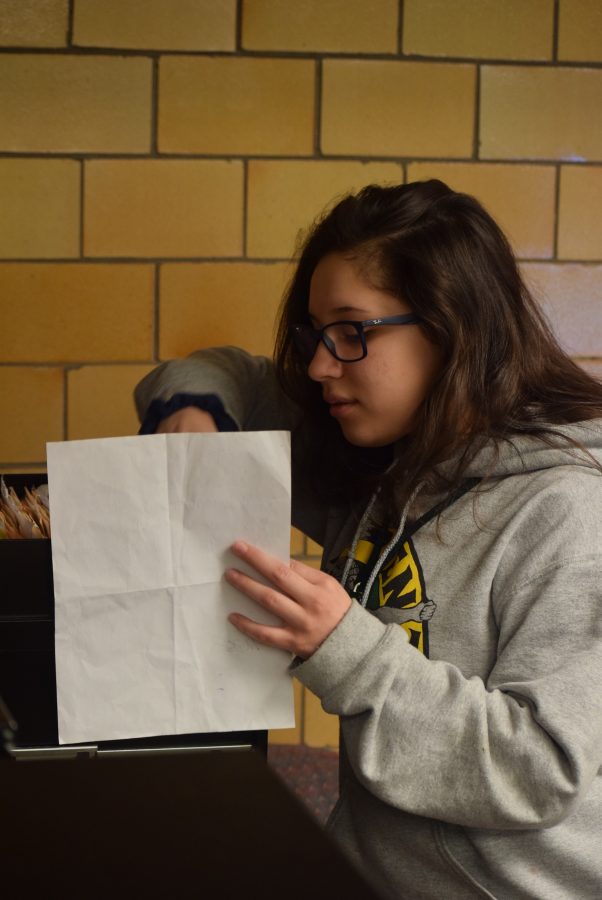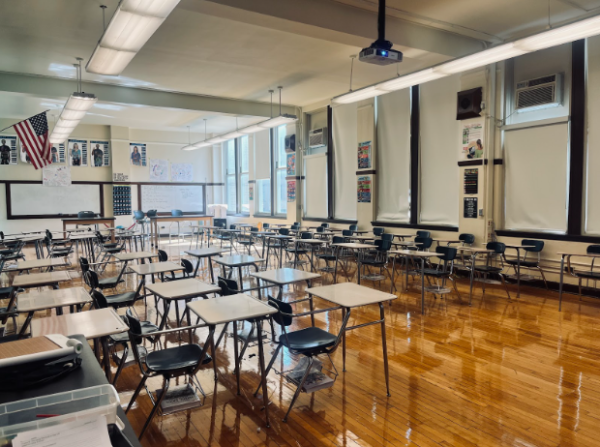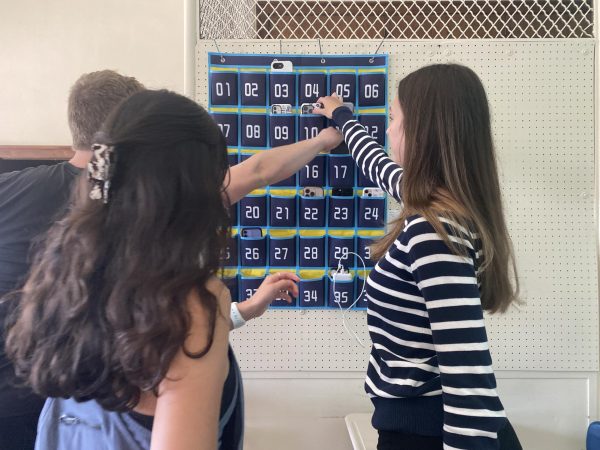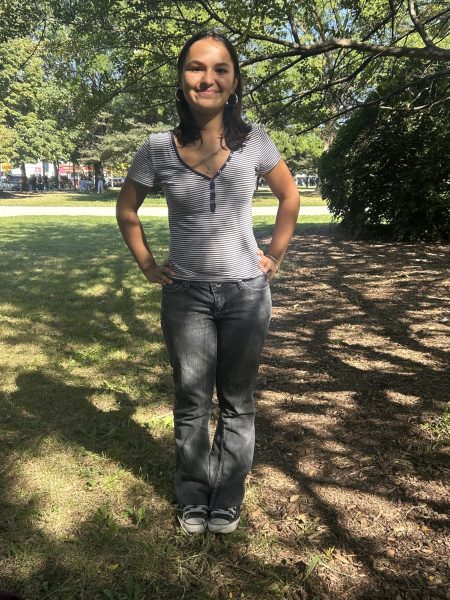New graduation requirement to inspire young voters
Civics student Brianna Santiago, Div. 771, files papers for the attendance office as a part of the current Civics course responsibilities. These responsibilities sometimes include organizational jobs for different offices throughout the school, in contrast to the new Civics class being implemented for freshmen this school year.
Students rush to finalize their class schedules, hoping to get into their top choices. However, they encounter a problem. On top of the 27 credits needed to graduate, they find out they need one more.
Chicago Public Schools (CPS) has announced that the current and incoming freshmen will need to complete one semester of a civics education course. The course mandate took effect on July 1, 2016, according to the Illinois Civics website.
The Social Science Department has been tasked to create a class that will provide all incoming and current freshmen with core knowledge about the government and common civic duties.
According to AP US Government teacher Ms. Caracci, the course will teach students how government and elections work, who they are voting for, and what that vote means.
“I think our current political climate is hopefully showing everyone, particularly the youth, that you need to be aware of what’s going on in our political life,” Caracci said. “You need to have an understanding of the processes that get people into certain positions and once they’re in those positions, what kind of power they have.”
CPS Civics Engagement Manager Heather Van Benthuysen has been working with CPS schools and organizations to discuss the importance of students being engaged and connected to their government.
“It’s not just about learning about the political process, we want you participating in it,” Van Benthuysen said. The lack of student participation in politics stems from the deficiency of political education. CPS schools have not been required to administer a civics class until now.
“In Illinois we have one of the lower rates of youth voting participation,” said Jessica Marshall, CPS Director of Social Science and Civic Engagement. “We have a high level of distrust in the government in our state, compared to other states.”
Students will have two options when it comes to choosing how they want to complete the requirement – a Civics semester course paired with a semester course of another honors history course. These courses can be either Modern US History, Economy, Chicago History, or World Religions. These two semesters combined fill the third social science requirement. The second option is AP US Government.
In regards to the AP US Government course, Caracci said, “You are learning many of the same principles and concepts about government, but just going even deeper and beyond it.”
According to the CPS Civic Engagement Course Description, the course curriculum is not textbook based so that teachers will be able to have a flexible schedule when teaching. However, teachers can choose to follow the curriculum that is being developed by CPS.
The curriculum is divided up into two main sections of teaching: Launch Lessons and Explorations.
Launch Lessons consist of four units that allow teachers to educate students on the key ideas and concepts regarding our government. Explorations allow teachers to go deeper into the concepts and decide how they want the curriculum to be taught.
“Teachers will discuss current and controversial issues that are impacting students’ lives and the immediate community in which students live,” Van Benthuysen said.
Illinois was one of last states to mandate a civics curriculum.
“We were one of only 10 states in the country that did not require students to take a civics of government class,” Marshall said. “it’s a pretty common thing in the rest of country that we expect students to learn these things in school, but in Illinois we didn’t have that.”
Mr. Carity, head of the Social Science Department and AP Macroeconomics teacher, views the new requirements as more than just an opportunity for academic growth. Carity voiced his opinion on the significance of citizens, especially students, understanding their role and their rights within their country.
“I think that we are going to have, not that we don’t already, more well-rounded students,” Carity said. “And that’s our goal here at Lane.”
The current political climate has impacted students across Chicago, including Lane. Several students and teachers have participated in rallies near and around Chicago and have voiced their opinions about the new political atmosphere.
Sara Ryan-Jetha, Div. 869, has taken part in several marches in Chicago and the Women’s March on Washington.
“With recent transitions of power, it is more important than ever for students to be as informed as possible about what is going on,” Ryan-Jetha said.
Social media has been a major outlet for the public to express their opinions and views. With that being said, not every post or news article contains valid information, and can be deemed as an improbable source.
“One of the things I noticed a lot, in just reading, friends on Facebook, and fake news, is that a lot of people do not have a great understanding of how the government works and that is a big problem,” Caracci said.
The new civics class will inform and strengthen students’ political views to allow students to gain political knowledge to assist them in future political activities.
“I think it will for sure benefit students’ futures because when you’re informed about what is happening in your country and community, you are more likely to do something about it,” Ryan-Jetha said.
Your donations directly fund the Lane Tech student journalism program—covering essential costs like website hosting and technology not supported by our school or district. Your generosity empowers our student reporters to investigate, write, and publish impactful stories that matter to our school community.
This website is more than a publishing platform—it's an archive, a research tool, and a source of truth. Every dollar helps us preserve and grow this resource so future students can learn from and build on the work being done today.
Thank you for supporting the next generation of journalists at Lane Tech College Prep!

I’m a junior at Lane and in Journalism I. I participate in Dance Team as well as Ukrainian Club.
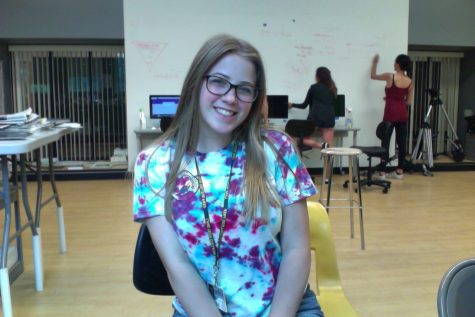
Hi! My name is Jadyn Dubach and I have been a part of the Warrior for one year. I am very excited and passionate about the newspaper. Here at Lane, I have...
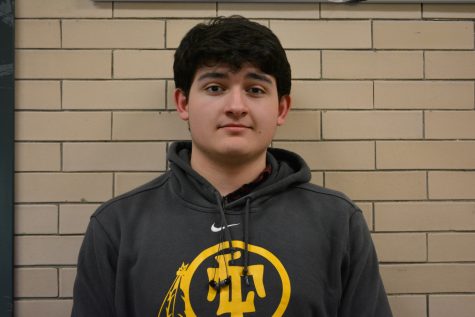
James Coyne started Journalism in his sophomore year and became the Photo Editor his senior year. He has focused most of his work towards the feature...

